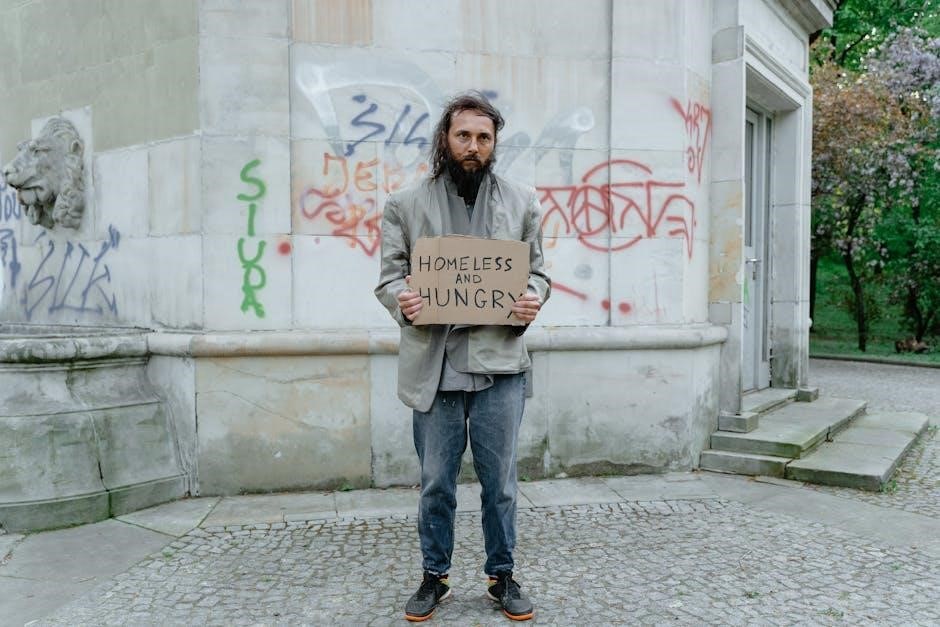
Poor Economics by Abhijit Banerjee and Esther Duflo offers a groundbreaking perspective on global poverty‚ blending empirical research with innovative solutions. Available in PDF and digital formats‚ it challenges traditional approaches to development economics‚ emphasizing randomized control trials and real-world evidence to understand the complexities of poverty. This influential book has reshaped economic policies and remains a vital resource for researchers and policymakers worldwide.
1.1 Overview of the Book
Poor Economics is a seminal work by Abhijit Banerjee and Esther Duflo that challenges conventional wisdom on poverty. It explores the complexities of global poverty‚ offering evidence-based strategies to address it. The book emphasizes understanding the daily lives of the poor‚ highlighting their resourcefulness and the challenges they face. By leveraging randomized control trials‚ the authors provide actionable insights into effective poverty alleviation. Available in PDF and other digital formats‚ the book is accessible to a wide audience‚ making it a valuable resource for policymakers‚ researchers‚ and anyone interested in development economics. Its innovative approach has made it a cornerstone in the field.

1.2 Authors: Abhijit Banerjee and Esther Duflo
Abhijit Banerjee and Esther Duflo are renowned economists known for their pioneering work in development economics. They are professors at MIT and co-founders of the Poverty Action Lab (J-PAL)‚ which focuses on evidence-based approaches to poverty alleviation. Their collaborative research emphasizes the use of randomized control trials to understand and address global poverty. Banerjee and Duflo’s innovative methods have significantly influenced economic policies worldwide. Their work has been widely recognized‚ including the 2019 Nobel Prize in Economics. Their co-authored book‚ Poor Economics‚ is available in various formats‚ including PDF‚ making their groundbreaking research accessible to a broad audience.
1.3 Key Themes and Objectives
Poor Economics challenges conventional wisdom on poverty by focusing on the daily lives and decision-making of the poor. It emphasizes understanding poverty beyond income levels‚ highlighting behavioral‚ psychological‚ and structural factors. The book advocates for evidence-based policies‚ urging a shift from ideological debates to practical‚ data-driven solutions. By examining real-world scenarios‚ Banerjee and Duflo reveal why many anti-poverty programs fail and propose targeted interventions. Their approach prioritizes rigorous testing of solutions through randomized control trials. The ultimate goal is to create policies that empower the poor‚ addressing their specific needs and fostering sustainable economic growth. This makes Poor Economics a vital resource for policymakers and researchers.

The Concept of Poverty
Poverty extends beyond low income‚ encompassing limited access to education‚ healthcare‚ and opportunities. Banerjee and Duflo explore how behavioral and structural factors trap people in poverty.

2.1 Defining Poverty: Beyond Income Levels
Defining poverty requires looking beyond income levels. Banerjee and Duflo argue that poverty encompasses not just financial deprivation but also limited access to education‚ healthcare‚ and social services. They emphasize that the poor often face a range of challenges‚ including food insecurity‚ inadequate housing‚ and lack of opportunities. This broader perspective highlights how poverty is a multifaceted issue that cannot be addressed solely through economic measures. By understanding the various dimensions of poverty‚ policymakers can design more effective interventions that address its root causes and improve overall well-being.
2.2 The Complexity of Global Poverty
Global poverty is deeply complex‚ shaped by varied contexts across regions and communities. Banerjee and Duflo highlight that poverty is not a uniform issue but is influenced by local factors such as geography‚ culture‚ and institutions. The book emphasizes that understanding these nuances is crucial for effective solutions. For instance‚ access to education‚ healthcare‚ and financial services varies widely‚ affecting poverty levels. The authors stress the importance of empirical evidence to uncover the specific challenges faced by different populations. This approach underscores the need for tailored interventions rather than one-size-fits-all strategies to address the intricate nature of global poverty.
2.3 Understanding the Lives of the Poor
Poor Economics delves into the daily lives of the poor‚ revealing their struggles and coping mechanisms. Banerjee and Duflo show how the poor make rational decisions within their constraints‚ often borrowing to save or investing in hope of better futures. The book challenges stereotypes‚ emphasizing that poverty is not due to a lack of ambition but complex structural barriers. By examining real-world behaviors‚ the authors provide insights into how the poor allocate resources‚ prioritizing essentials like healthcare and education. This understanding is crucial for designing policies that address their specific needs and aspirations‚ rather than oversimplified solutions. The book’s empirical approach humanizes poverty‚ offering a deeper connection to the lives it affects.

Core Ideas in “Poor Economics”
Poor Economics challenges traditional poverty solutions‚ advocating for evidence-based interventions. It emphasizes randomized control trials to test policies‚ ensuring effective and sustainable outcomes for the poor globally.
3.1 Rethinking Traditional Approaches to Poverty
Abhijit Banerjee and Esther Duflo challenge conventional poverty alleviation methods in Poor Economics. They argue that simplistic solutions often fail due to a lack of understanding of the poor’s complex lives. The book emphasizes the need to move beyond one-size-fits-all approaches‚ instead advocating for targeted‚ evidence-based interventions. By focusing on the nuanced realities of poverty‚ Banerjee and Duflo propose radical yet practical strategies to address this global issue effectively. Their approach has been widely praised for its depth and innovative thinking‚ making it a cornerstone of modern development economics.
3.2 The Role of Randomized Control Trials
In Poor Economics‚ Abhijit Banerjee and Esther Duflo highlight the transformative role of randomized control trials (RCTs) in understanding poverty alleviation strategies. RCTs allow researchers to test interventions in real-world settings‚ providing rigorous evidence on what works. By comparing outcomes between treatment and control groups‚ RCTs help identify effective solutions to poverty. This methodology has been pivotal in designing policies that address specific challenges faced by the poor‚ ensuring interventions are evidence-based and scalable. Banerjee and Duflo’s work demonstrates how RCTs can bridge the gap between theory and practice‚ offering actionable insights for policymakers and practitioners worldwide.
3.3 Empirical Evidence in Development Economics
Abhijit Banerjee and Esther Duflo’s Poor Economics emphasizes the critical role of empirical evidence in development economics. By leveraging data from real-world observations and experiments‚ they challenge conventional theories and offer practical insights. Their work underscores the importance of understanding the daily lives of the poor through detailed surveys and field studies. This approach ensures policies are grounded in reality‚ addressing specific barriers to poverty reduction. The book’s reliance on empirical data has set a new standard for research in development economics‚ making it a cornerstone for effective and sustainable anti-poverty strategies globally.

Policy Implications
Poor Economics highlights innovative policy solutions to combat poverty‚ emphasizing the role of governments and NGOs in implementing evidence-based interventions. Case studies demonstrate effective strategies to reduce global poverty.
4.1 Innovative Solutions to Fight Poverty
Poor Economics proposes innovative solutions to tackle poverty‚ focusing on evidence-based interventions. Banerjee and Duflo advocate for targeted programs‚ such as microfinance and conditional cash transfers‚ to address specific needs. They emphasize the importance of understanding the daily challenges faced by the poor‚ such as access to healthcare and education. By using randomized control trials‚ they identify effective strategies that can be scaled up. Their approach challenges traditional aid models‚ promoting a more nuanced and impactful way to reduce global poverty. These solutions are detailed in the book‚ offering actionable insights for policymakers and practitioners.
4.2 The Role of Governments and NGOs
Governments and NGOs play a crucial role in implementing poverty reduction strategies‚ as highlighted in Poor Economics. Banerjee and Duflo emphasize the need for collaborative efforts‚ combining the resources of governments with the grassroots expertise of NGOs. Effective policies often require targeted interventions‚ such as conditional cash transfers or microfinance programs‚ which can be scaled with government support. NGOs‚ meanwhile‚ provide valuable insights into local contexts‚ ensuring interventions are culturally relevant and impactful. The book underscores the importance of accountability and evidence-based decision-making to maximize the effectiveness of these partnerships. Their collaborative approach is a cornerstone of sustainable poverty alleviation efforts.
4.3 Case Studies and Success Stories
Poor Economics presents compelling case studies and success stories that illustrate effective poverty reduction strategies. Examples include microfinance programs in Bangladesh and conditional cash transfers in Mexico‚ which demonstrate how targeted interventions can improve education and healthcare outcomes. The book highlights the success of NGOs like BRAC in scaling interventions effectively. These real-world examples provide evidence that small‚ well-designed changes can lead to significant improvements in the lives of the poor. Banerjee and Duflo emphasize the importance of learning from these successes to inform future policies and practices‚ creating a roadmap for sustainable poverty alleviation globally.

The Authors’ Contributions
Abhijit Banerjee and Esther Duflo are renowned economists whose work has transformed development economics. Their innovative use of randomized control trials and empirical research has reshaped poverty alleviation strategies globally. Both professors at MIT‚ they co-founded the Abdul Latif Jameel Poverty Action Lab (J-PAL)‚ which tests anti-poverty interventions. Their pioneering work earned them the 2019 Nobel Prize in Economics‚ recognizing their impactful contributions to understanding and addressing global poverty through evidence-based solutions.
5.1 Abhijit Banerjee’s Work in Development Economics
Abhijit Banerjee‚ a leading economist‚ has significantly contributed to development economics through his innovative approaches to understanding global poverty. His pioneering work with randomized control trials (RCTs) has revolutionized how anti-poverty interventions are designed and evaluated. As co-founder of J-PAL‚ Banerjee has championed evidence-based policy-making‚ ensuring that development programs are rigorously tested for effectiveness. His research spans education‚ healthcare‚ and microfinance‚ providing actionable insights for policymakers. Banerjee’s collaborative efforts with Esther Duflo have been instrumental in shaping modern development economics‚ earning him the 2019 Nobel Prize and solidifying his legacy in the field.
5.2 Esther Duflo’s Pioneering Research
Esther Duflo‚ a trailblazer in development economics‚ has transformed the field through her meticulous research and innovative approaches to understanding poverty. Her groundbreaking use of randomized control trials has provided actionable insights into effective anti-poverty interventions. Duflo’s work emphasizes the importance of evidence-based policy design‚ particularly in education‚ healthcare‚ and microfinance. Her collaborative efforts with Abhijit Banerjee have been instrumental in shaping modern development economics. As the youngest woman to win the Nobel Prize in Economics (2019)‚ Duflo’s research continues to inspire global efforts to combat poverty‚ offering a deeper understanding of the complexities faced by the world’s poorest populations.
5.3 The Nobel Prize in Economics (2019)
In 2019‚ Abhijit Banerjee‚ Esther Duflo‚ and Michael Kremer were awarded the Nobel Prize in Economics for their innovative approaches to understanding and addressing global poverty. Their pioneering work‚ as detailed in Poor Economics‚ emphasized the use of randomized control trials to design and evaluate anti-poverty programs. This recognition marked a significant shift in the field of development economics‚ validating the importance of evidence-based interventions. The Nobel Prize highlighted the transformative impact of their research‚ making it a cornerstone in the fight against global poverty and inspiring new strategies to improve the lives of millions worldwide.

Reception and Impact
Poor Economics received widespread acclaim for its innovative approach to understanding poverty. It influenced global policies‚ inspired new research‚ and remains a widely accessed resource‚ fostering meaningful discussions on poverty reduction.

6.1 Reviews and Criticisms
Poor Economics has received widespread critical acclaim for its accessible and insightful approach to understanding poverty. Reviewers praise its clear‚ evidence-based narrative and innovative solutions. Critics‚ however‚ argue that some proposals oversimplify complex issues. Despite this‚ the book remains a landmark work‚ influencing both policy and public discourse. Its PDF availability has further widened its reach‚ making it a key resource for scholars and policymakers alike. The book’s impact underscores its relevance in addressing global poverty challenges.
6.2 Influence on Global Economic Policies
Poor Economics has significantly influenced global economic policies by providing evidence-based solutions to poverty. Its emphasis on randomized control trials has reshaped development economics‚ encouraging policymakers to adopt more rigorous‚ data-driven approaches. The book’s insights have informed initiatives by governments‚ NGOs‚ and international organizations‚ fostering more effective poverty alleviation programs. Its accessibility in formats like PDF has further amplified its reach‚ making it a foundational resource for policymakers worldwide. By challenging traditional assumptions and offering practical strategies‚ Poor Economics continues to drive meaningful changes in global economic policies aimed at reducing poverty and improving living standards.
6.3 Popularity and Accessibility of the Book
Poor Economics has gained widespread popularity due to its clear‚ engaging writing style and its ability to make complex economic concepts accessible. Available in formats like PDF‚ the book has reached a broad audience‚ including policymakers‚ researchers‚ and general readers. Its digital versions have further enhanced its accessibility‚ allowing people worldwide to explore its insights. The book has been translated into multiple languages‚ expanding its reach and impact. As a bestseller‚ Poor Economics has influenced public discourse on poverty and development‚ making it a vital resource for understanding global economic challenges and innovative solutions.

Availability and Access
Poor Economics is widely available in PDF and digital formats‚ published by Random House and PublicAffairs. It can be purchased on platforms like Amazon or accessed through libraries and online repositories.
7.1 PDF and Digital Versions
Poor Economics is available in PDF and digital formats‚ making it accessible to a global audience. Published by Random House and PublicAffairs‚ the book can be downloaded from various platforms like Amazon‚ Google Books‚ and online repositories. Many websites offer free PDF versions for educational purposes‚ though purchasing from authorized sources is recommended for quality and legality. The digital version ensures easy access and portability‚ allowing readers to explore its insights on poverty and economic development conveniently. This format has contributed to the book’s widespread popularity and influence in global economic discussions.
7.2 Publisher and Publication Details
Poor Economics was published in 2011 by PublicAffairs‚ an imprint of Hachette Book Group‚ and Random House. The book is part of the groundbreaking work by Abhijit Banerjee and Esther Duflo‚ renowned economists and founders of MIT’s Poverty Action Lab. Its publication marked a significant contribution to development economics‚ offering evidence-based strategies to combat global poverty. The book’s success led to widespread recognition‚ including the 2019 Nobel Prize in Economics. Publisher details are clearly stated in both print and digital editions‚ ensuring authenticity and accessibility for readers worldwide.
7.3 Where to Find the Book
The Poor Economics book is widely available in various formats‚ including PDF‚ paperback‚ and e-book. It can be purchased from major online retailers like Amazon‚ Barnes & Noble‚ and Google Books. Additionally‚ many academic databases and libraries offer access to digital versions. The book is published by PublicAffairs and Random House‚ ensuring its availability through reputable sources. For those seeking free access‚ some platforms like ResearchGate or academic repositories may offer limited previews or downloadable versions‚ though purchasing from authorized sellers is recommended for full access.